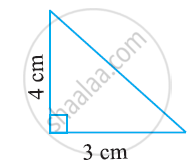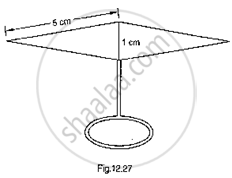Advertisements
Advertisements
Question
Find the value(s) of k so that the quadratic equation x2 − 4kx + k = 0 has equal roots.
Solution
Given equation is x2 − 4kx + k = 0
For the given equation to have equal roots, D = 0.
`rArr b^2-4ac=0 `
`rArr (-4k)^2-4(1)(k)=0`
`rArr 16k^2-4k=0`
`rArr 4k(4k-1)=0`
`rArr4k=0`or `k=1/4`
Hence, for k = 0 or `1/4`, the given equation will have equal roots.
APPEARS IN
RELATED QUESTIONS
If P(–5, –3), Q(–4, –6), R(2, –3) and S(1, 2) are the vertices of a quadrilateral PQRS, find its area.
If the points P(–3, 9), Q(a, b) and R(4, – 5) are collinear and a + b = 1, find the values of a and b.
Find the area of the following triangle:

If the coordinates of the mid-points of the sides of a triangle are (1, 1), (2, —3) and (3, 4), find the vertices of the triangle.
Find the area of a triangle whose sides are 9 cm, 12 cm and 15 cm ?
Find the area of the blades of thc magnetic compass shown in Fig.. 12.27. (Take √11 = 3.32).

Show that the following points are collinear:
A(-5,1), B(5, 5) and C(10, 7)
Show that ∆ ABC with vertices A (–2, 0), B (0, 2) and C (2, 0) is similar to ∆ DEF with vertices D (–4, 0), F (4, 0) and E (0, 4) ?
Find the cost of laying grass in a triangular field of sides 50 m, 65 m and 65 m at the rate of Rs 7 per m2.
In the given figure, area of ΔPQR is 20 cm2 and area of ΔPQS is 44 cm2. Find the length RS, if PQ is perpendicular to QS and QR is 5 cm.

